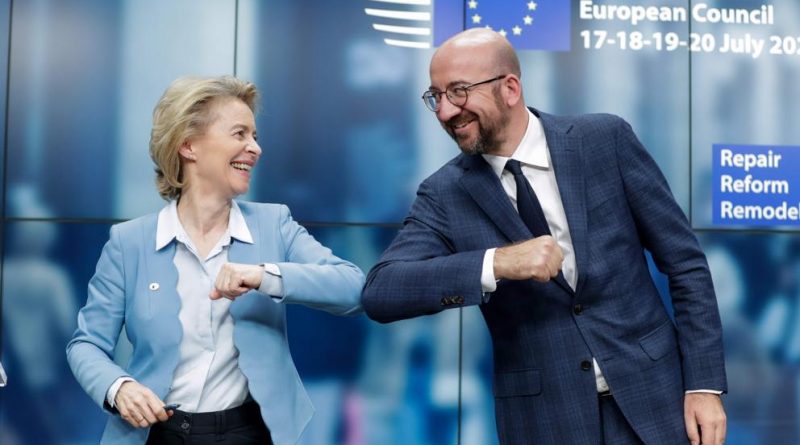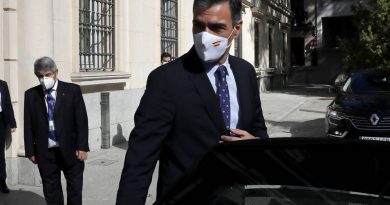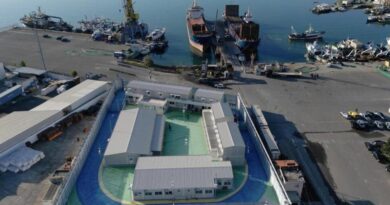Agreement in the European Union for the recovery fund
Scopes, consequences and perspective of the imperialist rescue plan.
The members of the EU agreed on the amounts and terms of “Recovery plan” in the face of the Covid-19 crisis.
What are the amounts, how and when they will be distributed? A fund was allocated for a total of 750.000 millions of euros, distributed as follows: 390.000 millions directed to "Stimulate the economy and face the coronavirus crisis", that will reach the States as direct aid and will not have to be returned. The rest 360.000 millions will be granted in credits, as debt with a refund obligation. Added to this is the seven-year EU budget for 1.074 trillion euros. It is the first time that the European Commission (THIS) has been authorized by its 27 members to borrow in international markets, to issue bonds and create a common debt for the total fund to be repaid, to get money to the States. It will be solved with the creation of new community and local taxes, with taxes on first-use plastics, carbon tax, a digital rate and others. Ultimately, it will come out of the pockets of the town. The cast will be staggered, delivery of 70% of the aid will be made in the period 2021-2022, he 30% remaining will be rotated on the 2023. It will be done based on the level of unemployment 2015-2019 and from 2023 based on loss of GDP 2020-2021. For the agreement to enter into force, must be ratified by the Parliaments of each State and the European Parliament.
How was understanding stitched together? The debate on the amount, recovery fund requirements and controls take months, with different positions. The first fact that made the approach feasible was consummated with the "round" from Germany, who for the first time decided to relax the rules of "austerity" at all costs and approve aid without repayment. He 19 May Chancellor Angela Merkel and French President Emmanuel Macron, announced their intention to compromise 500.000 million euros to the recovery fund. This decision of the two key pillars of the EU opened the door to negotiation with the rest of the Club members. The most reticent were the so-called frugal countries (Holland, Denmark, Sweden and Austria) more Finland, who threatened to veto the “mutualización” of debts and demanded strict conditions of granting, return and control. The main spokesperson was the Dutch Prime Minister, Mark Rutte, which summed up his position: "If you make a request for help, you must make major reforms ”. They finally sealed the deal in Brussels, after 90 consecutive hours of meetings, bilateral encounters and clashes on the verge of failure. Countries “frugales” they vetoed the vetoes, but they imposed a cut to the EC and the Franco-German tandem 22% to the total amount of aid that is not repaid, set conditions of use, supervision and achieved an increase in the returns they will receive in the budgets 2021- 2027, meaning more money for your coffers.
Were conditions established? Yes. In the event that a Member State considers that there are deviations from compliance, may require that the matter be discussed in the CE and the transfers be paralyzed, appealing to the qualified majority mechanism (15 states and the 65% population), he was called the "emergency break”. To get aid, countries should present "Reform plans aimed at creating employment and sustainability", tied to the recommendations of the European Commission in the labor market, pensions, budgets and fiscal policy. further, the "Conditionality on the rule of law". This implies that the EU could not make demands on the curtailment or violation of democratic freedoms that may eventually be executed by governments that receive aid.. It was a flashy point of much debate that was drafted with a general formulation, to avoid the veto of Hungary and Poland, whose right-wing governments and authoritarian regimes are under evaluation by the EU Council for the violation of rights.
It is the first time that the European Commission (THIS) has been authorized by its 27 members to borrow…
How do i went to Spain? He central government will receive 140.000 millions, 72.700 millions of them fit help fund. Sánchez presented it as a great triumph of the weak PSOE-UP government and returned emboldened in the face of the negotiation of budgets. But you already perceived that nothing will be easy for you in Congress. There it debated the views of the Reconstruction Commission, where he managed to get ahead sanitary and european conclusion packages, and not the social ones, the reconstruction plan has not had the consensus that the executive expected.
How are conditioning and labor reform related? Sánchez considers that the conditions are normal because "Spain already has its agenda aligned with the agenda of the European Commission". Pablo Iglesias affirms that it is “soft conditions that do not imply the need for cuts ”. The agreement of both is accompanied by the leaders of the PP, Cs, UGT and CC.OO. among others. The truth is that the government has already failed to fulfill the promise to repeal all the disastrous labor reform imposed by Mariano Rajoy (PP), saying that they really only pretend "Change the most damaging aspects". With the agreement, the possibility of making even minor modifications is removed, frowned upon by Brussels. It's more, they can try to relax more or turn a blind eye with the deepening of labor abuses installed under the umbrella of the "New normal".
What are companies looking for? The patterns are "Rub your hands". After having been favored by the State with the Temporary Employment Regulation Files (FOR HIM) to those who passed millions of workers off their obligations, the government already enabled an amount of 10.000 millions; in order to rescue the "Strategic companies at national and regional level". They are authorized to request from 25 million euros onwards and so "Strengthen your solvency". Some of the candidate companies to request the ransom are: Iberia, the Globalia group, owner of Air Europa and owner of Halcón Viajes, as well as Duro Felguera, among other. The spokesmen for the executive also warned that their financial entry into companies experiencing a difficult situation is compatible with aid..
Is a economic relief? What will happen to the debts? Aid will not be two trillion how they initially shuffled. Neither 500.000 millions as France asked, Germany and southern European countries. Equally, the injection of money provides the conditions for a partial recovery of the European economy; it is a respirator to remove you from the intensive care unit, within a sick world economy with a reserved prognosis. Spanish public debts and Italian had already reached very risky limits before the pandemic, what I know will worsen in the future, when they have to repay the millions of euros borrowed. More debt was always synonymous with budget cuts and adjustments.
Why didn't they choose a “shock” adjustment? There are several reasons. 1- In the context of an unprecedented crisis in the capitalist economy, dropping the weakest countries would imply the possibility of dragging the Union as a whole. 2- The block comes from going through its worst moment of discredit, crossed by social problems, migration and political crises, whose maximum expression was Brexit. A new failure could have meant a fatal blow in a double sense: the generation of greater weakness in the dispute against other imperialisms and the increase of mistrust in the project “Europeanist” community, in favor of "Eurosceptics" far right. 3- European imperialism assessed that, in full pandemic, with thousands of infected people, deceased and growing discontent, it is not at the right moment to apply the same recipes that the Troika imposed on Greece when it went bankrupt. 4- The most important, they panic at the possibility that the European peoples will rebel, with pops, mobilizations and strikes out of control, as it is happening in different countries of the world. They still have images of the "Yellow jackets", of the historic French strike and the first reactions of the European labor movement to the consequences of the crisis.
There will be no general welfare, sooner or later there will be more adjustment, more precariousness and social inequality.
What is it really "historical"? The bourgeois governments celebrated the agreement. According to Emmanuel Macron he was a "Historical day for Europe". For Angela Merkel "Europe has shown in this situation to be able to act". President of the European Council, Charles Michel, express "European magic works". They also talked about a “Re-foundation of the EU” and of “Redirect a solidarity project”. Not a word to believe. They are guided by their own political convenience and salvage to profits. What is really "historical" is the economic collapse, political and social of the capitalist system.
There are “Plan Marshall”? It is valid to make some comparisons between what was the "European Reconstruction Program" from the USA. THE. and what will be the Post-pandemic Recovery Plan from the EU. First, it was executed at the end of a world warfare, with the aim of stifling revolutions and diminishing the influence of the USSR, after the Yalta and Potsdam Pacts in which the western powers and Stalinism divided their areas of influence – the second, will run post pandemic of Covid-19, to mitigate the effects of the economic crisis and prevent the collapse of the EU. It was a Program directed by a triumphant and emerging Yankee imperialism as a hegemonic power – to be led by senior officials of decadent imperialism, whose community project is questioned. It was implemented to create a European market in which to place expanding Yankee production – will be run to stop business bankruptcy, the crash of the stock market and the collapse of mass consumption. The money for the aid came from the Yankee national budget in foreign territory – will be solved with the issuance of bonds and mutual debt. Aid was granted without refund, mainly to the states of the industrial powers - aid and loans will be granted under conditions of structural reforms and repayment, the largest funds will go to the poorest countries affected by the consequences of Covid-19. References to “Plan Marshall” they were more linked to the pressure to obtain aid and to journalistically magnify their results than to a strict similarity with the North American program.
Is there another way out? When the final distribution of the millions of euros in dance is defined, possibly dump some of the money on some social aspects, in the case of the Spanish State extolled by the self-defined as "The most progressive government in history". But, surely, the most benefited will be a handful of the privileged above the needs of the workers and the people, of the most vulnerable, the poorest, women, youth and immigrants. There will be no general welfare. Sooner or later there will be more adjustment, more precariousness and social inequality. The pacts assumed between exploiters and oppressors were never favorable to the great majority and this, will not be the exception. The injection of money will allow some partial recovery, Nevertheless, at this stage of capitalism no aid is proposed that implies a stable recovery, durable and real production, because speculation dominates and in the end money will return to the financial circuit that causes cyclical crises. The bottom exit goes through taking substantive sanitary measures, prioritize life over profit, break with the EU, shaping leftist alternatives and strengthening socialist and revolutionary organizations that fight for workers' governments and a Free Federation of European Socialist States.




